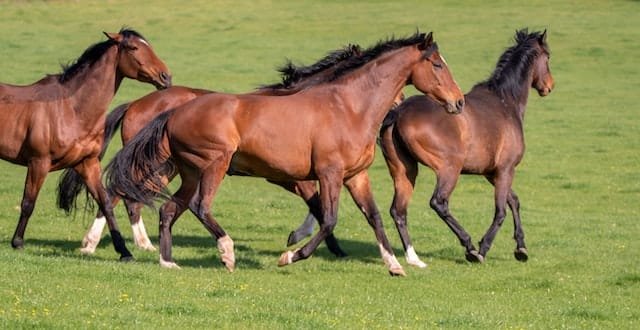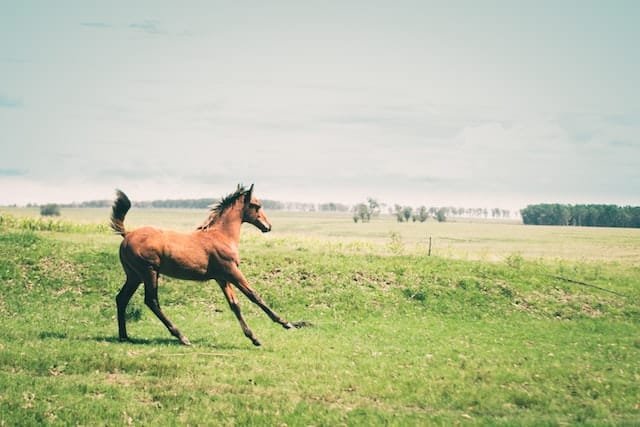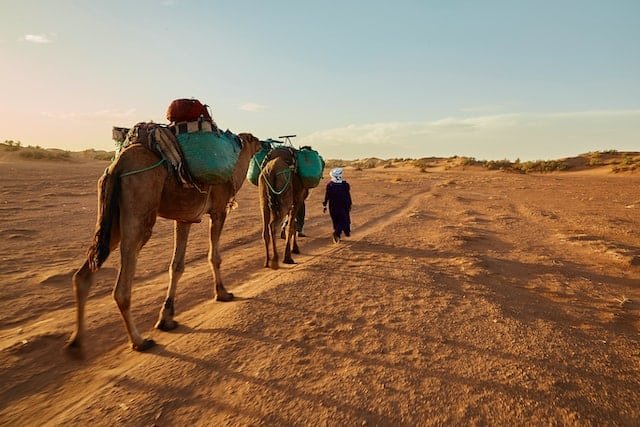Are horses predators? No. Horses are not predators. They are prey animals. This means they are more likely to be hunted by other animals for food rather than the other way around.
In this article, we will discuss the reasons why horses are not predators and how this affects their behavior and lifestyle. We will also explore how being a prey animal has shaped the horse’s history and relationship with humans.
We’ll also see how a horse’s herd behavior is linked to its being a prey animal. And finally, we’ll cover what being a prey animal means to wild horses and what the government is doing to protect wild horse herds.
Predators and Prey Animals: Defined & Examples
A predator is an animal that hunts and kills other animals for food. Predators are typically carnivores, meaning they eat meat. However, some predators are omnivores, meaning they eat both meat and plants. Examples of predators include lions, tigers, wolves, bears, cheetahs, sharks, orcas, alligators, snakes and of course humans.
Prey animals are animals that are hunted and killed by predators. Prey animals are typically herbivores, meaning they eat plants. However, some prey animals are omnivores. Examples of prey animals other than horses include deer, rabbits, squirrels, mice, zebras, chickens, cows, antelopes, pigs, goats, etc.
Are Horses Predators? No – And Here’s Why.
Horses do not hunt and kill other animals for food. They are herbivores, meaning they only eat plants. And so horses are not predators.
This doesn’t mean horses can’t kill. For instance, horses are known to have killed animals like foxes, snakes, and on rare occasions even people. But these are usually done in self-defense because the horse is scared or because it is protecting its young, rather than with an intent to kill. Because horses do not kill for food, they are not considered natural predators of other animals.
Horses, however, are prey animals and they display all the fears of prey animals. And as prey animals they have their own natural predators. Natural predators of horses include wolves, mountain lions, coyotes, and bobcats. In the wild, these predators will hunt and kill horses for food.

And so horses show an instinctive fear of these predators. However, they do how not show the same fear of other predators that are not their natural predators.
For instance, even though a snake is a predator, it is not a horse’s natural predator. And so horses are not scared of snakes unless they perceive a snake to be an immediate threat, in which case they could bolt and run or even attack and stomp the snake.
Horse Herd Behavior & Safety from Predators
Horses are herd animals. This means that in the wild they live in groups. The size of a horse herd can range from just a few horses to hundreds or even thousands of horses. That herd mentality often remains intact even in domesticated horses.
This herd instinct is strong in horses and it’s linked to their being prey animals. In the wild, the herd is the best defense against predators. There are more eyes to watch for predators and more bodies to protect the young and vulnerable.
When a predator is spotted, the herd will band together to defend its members. The herd will also move together as one unit to escape predators or even attack predators.
Evolution of horses as prey animals and relationship with humans
The natural instinct of prey animals facing danger from predators is to run. Prey animals, therefore, are typically more agile and have better eyesight than predatory animals. This is because they need these abilities to escape being hunted and killed.
Because they are prey animals, horses have evolved to be fast runners. They are able to reach speeds of up to 40 miles per hour when running in a straight line. Also, as we saw in the earlier section, horses have evolved to become herd animals. This makes them very social creatures that are comfortable living in close proximity to other horses, animals and even humans. As a matter of fact, horses when left alone can get lonely and depressed and many owners will bring in companion animals, like calming goats, to give company to their horses.
And even though some humans will eat horse meat, a horse does not see a human as a predator. In fact, over time, a horse will build up a trusting relationship with its owner and handler. This is because the horse trusts that these humans will not hurt or harm them in any way. This relationship of trust also is a by-product of the horse’s evolution as a prey animal and having the need to puts its trust in someone else for its survival.
Wild horses and predators
While domesticated horses are generally shielded from their natural predators, wild horses must still be on the lookout for them. In North America, the main predators of wild horses are mountain lions and wolves. Other predators include bears, coyotes, and bobcats.
In the United States, the Bureau of Land Management manages and protects wild horses and burros on public lands across 10 Western states. This is done through the Wild Horse and Burro Program. Part of the effort includes protecting the wild horse herds from excessive predation.
Final Thoughts
Despite the fact that horses can and have killed other animals, they are not predators. To be a predator, an animal must kill other animals for food. Horses are herbivores and do not kill other animals for food.
Being prey animals, horses have certain characteristics which have evolved over time, like being fast runners and living in herds. These characteristics help them to survive in the wild by avoiding being killed by predators.
The trusting relationship that can develop between a horse and a human is also due to the horse’s evolution as a prey animal.



